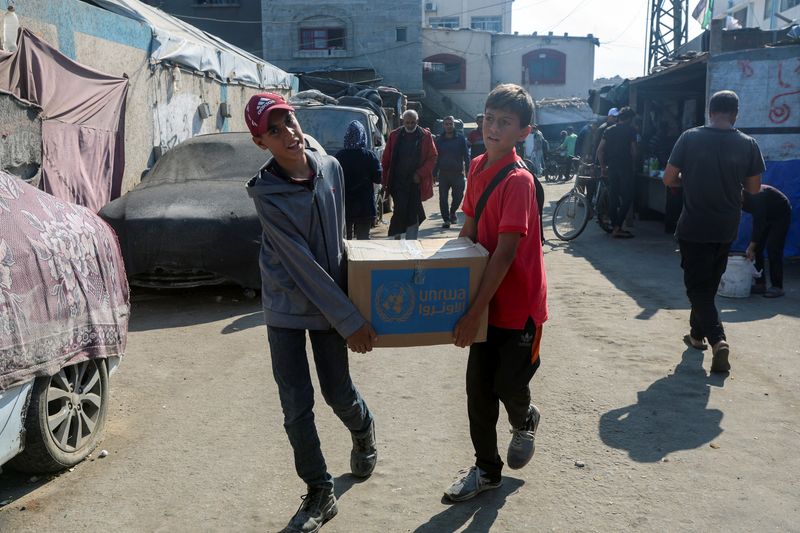By Michelle Nichols
UNITED NATIONS (Reuters) - The United Nations says replacing its Palestinian relief agency UNRWA in Gaza and the West Bank is not the world body's responsibility, signaling it was Israel's problem, according to a letter excerpt seen by Reuters.
The U.N. formally responded in a letter to Israel's decision to cut ties with the United Nations Relief and Works Agency, a move that UNRWA has said leaves its operations in Gaza and the West Bank at risk of collapse.
Under a new law, Israel told the U.N. on Sunday it was ending a 1967 cooperation agreement with UNRWA that covered its protection, movement and diplomatic immunity. The law will also ban UNRWA's operations in Israel from late January.
"I would note, as a general point, that it is not our responsibility to replace UNRWA, nor do we have the capacity to do so," U.N. Secretary-General Antonio Guterres' chef de cabinet, Courtenay Rattray, wrote to a senior Israeli foreign affairs official late on Tuesday.
The mention of responsibility is a veiled reference to Israel's obligations as an occupying power.
The U.N. views Gaza and the West Bank as Israeli-occupied territory. International humanitarian law requires an occupying power to agree to relief programs for people in need and to facilitate them "by all the means at its disposal" and ensure food, medical care, hygiene and public-health standards.
Israel's mission to the United Nations did not immediately respond to a request for comment on Rattray's letter.
"If UNRWA is no longer able to operate it would be the responsibility of the Israeli authorities to replace its services that it delivers to civilians, in education, in health, and all sorts of other areas," U.N. spokesperson Stephane Dujarric later clarified to reporters.
Top U.N. officials and the Security Council describe UNRWA as the backbone of the aid response in Gaza, where Israel and Palestinian militants Hamas have been at war for the past year, leaving the enclave in ruins and on the brink of famine.
"UNRWA may be defined by a single word – failure," Israel's U.N. Ambassador Danny Danon told a meeting of the General Assembly on UNRWA on Wednesday. "This idea that UNRWA could not be supplemented is absurd."
'DISASTROUS CONSEQUENCES'
Israeli Prime Minister Benjamin Netanyahu has long called for UNRWA to be dismantled, accusing it of anti-Israeli incitement. Israel also says UNRWA staff took part in the Oct. 7, 2023, Hamas attack on Israel, which sparked the war in Gaza.
The U.N. has said nine UNRWA staff may have been involved and had been fired. Later, a Hamas commander in Lebanon - killed in September by Israel - was found to have had an UNRWA job.
UNRWA was established in 1949 following the war surrounding the founding of Israel. It provides aid, health and education to millions of Palestinians in Gaza, the West Bank and neighboring Arab countries - Syria, Lebanon and Jordan.
The United Nations has repeatedly said there is no alternative to UNRWA.
UNRWA Commissioner-General Philippe Lazzarini told the U.N. General Assembly on Wednesday that implementing the Israeli law would have "disastrous consequences," adding: "Millions of Palestine refugees fear that the public services on which their lives depend will soon disappear."
"They fear that their children will be deprived of education; that illnesses will go untreated; and that social support will stop," Lazzarini said. "The entire population of Gaza fears that their only remaining lifeline will be cut."
In a letter to Netanyahu last week after Israel's parliament approved the new law on UNRWA, Guterres raised several legal issues with the decision.
Rattray reinforced that message, calling on Israel "to act consistently" with its obligations under the founding U.N. Charter and international law, stressing in his letter: "National legislation cannot alter those obligations."

Israel captured the West Bank, Gaza and East Jerusalem - areas the Palestinians want for a state - in a 1967 war. It withdrew from Gaza in 2005, but, along with neighboring Egypt, controls the enclave's borders.
Palestinian U.N. envoy Riyad Mansour told the General Assembly: "The agency is indispensable and irreplaceable."